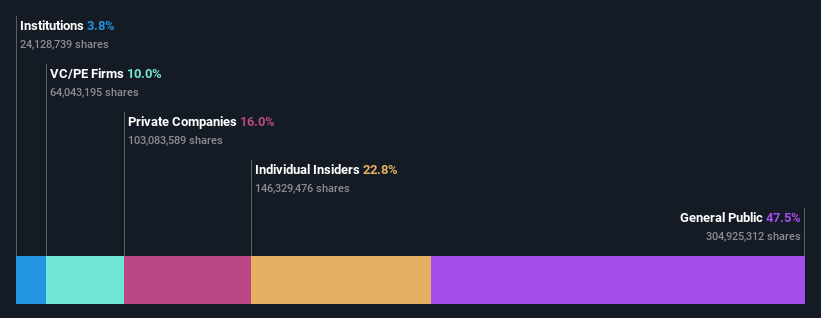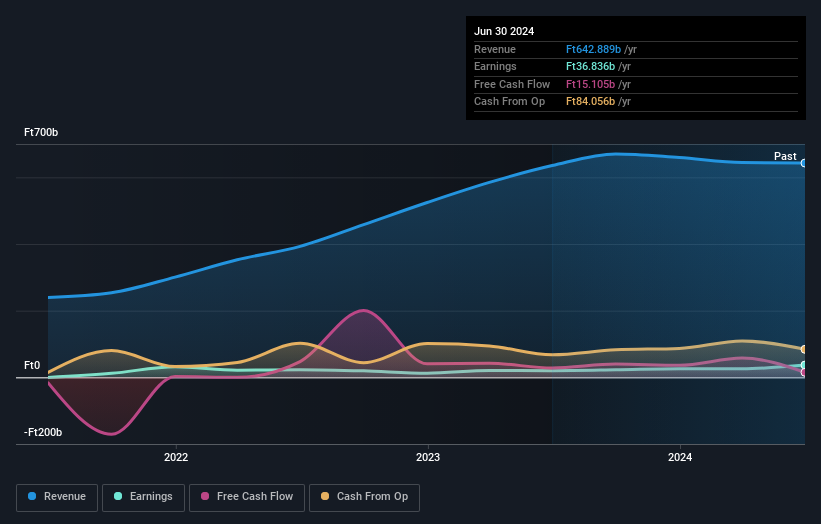- Hungary
- /
- Industrials
- /
- BUSE:OPUS
OPUS GLOBAL Nyrt.'s (BUSE:OPUS) largest shareholders are individual investors with 47% ownership, insiders own 23%

Key Insights
- The considerable ownership by individual investors in OPUS GLOBAL Nyrt indicates that they collectively have a greater say in management and business strategy
- A total of 6 investors have a majority stake in the company with 50% ownership
- Insider ownership in OPUS GLOBAL Nyrt is 23%
To get a sense of who is truly in control of OPUS GLOBAL Nyrt. (BUSE:OPUS), it is important to understand the ownership structure of the business. The group holding the most number of shares in the company, around 47% to be precise, is individual investors. Put another way, the group faces the maximum upside potential (or downside risk).
And individual insiders on the other hand have a 23% ownership in the company. Institutions will often hold stock in bigger companies, and we expect to see insiders owning a noticeable percentage of the smaller ones.
Let's delve deeper into each type of owner of OPUS GLOBAL Nyrt, beginning with the chart below.
Check out our latest analysis for OPUS GLOBAL Nyrt

What Does The Institutional Ownership Tell Us About OPUS GLOBAL Nyrt?
Many institutions measure their performance against an index that approximates the local market. So they usually pay more attention to companies that are included in major indices.
Since institutions own only a small portion of OPUS GLOBAL Nyrt, many may not have spent much time considering the stock. But it's clear that some have; and they liked it enough to buy in. If the business gets stronger from here, we could see a situation where more institutions are keen to buy. We sometimes see a rising share price when a few big institutions want to buy a certain stock at the same time. The history of earnings and revenue, which you can see below, could be helpful in considering if more institutional investors will want the stock. Of course, there are plenty of other factors to consider, too.

We note that hedge funds don't have a meaningful investment in OPUS GLOBAL Nyrt. The company's largest shareholder is Lorinc Mészáros, with ownership of 23%. Konzum Investment Fund Management Zrt. is the second largest shareholder owning 10.0% of common stock, and Konzum Management Kft. holds about 7.8% of the company stock.
On further inspection, we found that more than half the company's shares are owned by the top 6 shareholders, suggesting that the interests of the larger shareholders are balanced out to an extent by the smaller ones.
Researching institutional ownership is a good way to gauge and filter a stock's expected performance. The same can be achieved by studying analyst sentiments. As far as we can tell there isn't analyst coverage of the company, so it is probably flying under the radar.
Insider Ownership Of OPUS GLOBAL Nyrt
The definition of company insiders can be subjective and does vary between jurisdictions. Our data reflects individual insiders, capturing board members at the very least. Management ultimately answers to the board. However, it is not uncommon for managers to be executive board members, especially if they are a founder or the CEO.
I generally consider insider ownership to be a good thing. However, on some occasions it makes it more difficult for other shareholders to hold the board accountable for decisions.
Our most recent data indicates that insiders own a reasonable proportion of OPUS GLOBAL Nyrt.. It has a market capitalization of just Ft282b, and insiders have Ft64b worth of shares in their own names. We would say this shows alignment with shareholders, but it is worth noting that the company is still quite small; some insiders may have founded the business. You can click here to see if those insiders have been buying or selling.
General Public Ownership
The general public-- including retail investors -- own 47% stake in the company, and hence can't easily be ignored. This size of ownership, while considerable, may not be enough to change company policy if the decision is not in sync with other large shareholders.
Private Equity Ownership
Private equity firms hold a 10.0% stake in OPUS GLOBAL Nyrt. This suggests they can be influential in key policy decisions. Some might like this, because private equity are sometimes activists who hold management accountable. But other times, private equity is selling out, having taking the company public.
Private Company Ownership
Our data indicates that Private Companies hold 16%, of the company's shares. It might be worth looking deeper into this. If related parties, such as insiders, have an interest in one of these private companies, that should be disclosed in the annual report. Private companies may also have a strategic interest in the company.
Next Steps:
It's always worth thinking about the different groups who own shares in a company. But to understand OPUS GLOBAL Nyrt better, we need to consider many other factors.
I like to dive deeper into how a company has performed in the past. You can access this interactive graph of past earnings, revenue and cash flow, for free.
Of course this may not be the best stock to buy. Therefore, you may wish to see our free collection of interesting prospects boasting favorable financials.
NB: Figures in this article are calculated using data from the last twelve months, which refer to the 12-month period ending on the last date of the month the financial statement is dated. This may not be consistent with full year annual report figures.
New: AI Stock Screener & Alerts
Our new AI Stock Screener scans the market every day to uncover opportunities.
• Dividend Powerhouses (3%+ Yield)
• Undervalued Small Caps with Insider Buying
• High growth Tech and AI Companies
Or build your own from over 50 metrics.
Have feedback on this article? Concerned about the content? Get in touch with us directly. Alternatively, email editorial-team (at) simplywallst.com.
This article by Simply Wall St is general in nature. We provide commentary based on historical data and analyst forecasts only using an unbiased methodology and our articles are not intended to be financial advice. It does not constitute a recommendation to buy or sell any stock, and does not take account of your objectives, or your financial situation. We aim to bring you long-term focused analysis driven by fundamental data. Note that our analysis may not factor in the latest price-sensitive company announcements or qualitative material. Simply Wall St has no position in any stocks mentioned.
About BUSE:OPUS
OPUS GLOBAL Nyrt
Through its subsidiaries, engages in the construction business in Hungary, Germany, Austria, Switzerland, and Montenegro, other European countries, Asia, and internationally.
Proven track record with adequate balance sheet.
Market Insights
Community Narratives




